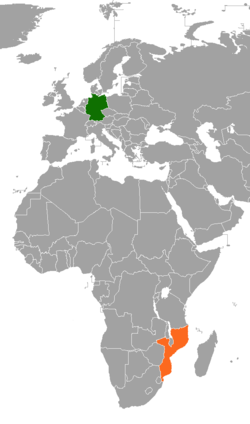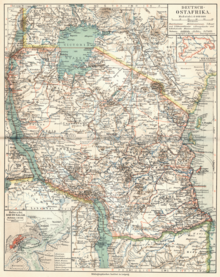German-Mozambican relations

|
|
|
|
|
| Germany | Mozambique |
Germany and Mozambique have maintained diplomatic relations since Mozambique gained independence in 1975.
In April 2006 the German President Horst Köhler visited Mozambique, the Mozambican President Armando Guebuza visited Germany in November 2007. Since then there have been numerous visits by German politicians and business commissions to Mozambique, and a number of Mozambican politicians have visited the Federal Republic of Germany.
history
Until 1975
Mozambique has been a Portuguese colony since Vasco da Gama arrived in 1498 , when the German Empire took possession of the area bordering to the north as German East Africa in 1885 . According to the German-British Heligoland-Zanzibar Treaty in 1890, the German Empire also considered the Kionga Triangle in the extreme northeast of Portuguese East Africa (now Mozambique) as part of German East Africa and occupied the area in 1894.
When the First World War broke out in August 1914 , Portugal was initially still neutral and only received a German declaration of war on March 9, 1916. As a result, Portuguese troops reoccupied the controversial Kionga triangle.
At the end of the First World War in East Africa, the rest of the German Schutztruppe for German East Africa withdrew from British forces to Mozambican territory in November 1917. In September 1918 they moved on to Northern Rhodesia, where they surrendered on November 25, 1918 after the news of the armistice in Europe.
The Kionga triangle was finally awarded to Portugal in the 1919 Versailles Peace Treaty .
In 1932, the Laurentina brewery, the first beer brewery in Mozambique, was founded. The recipe was developed by a German master brewer who was recruited in Germany and initially headed production in Mozambique.
Portuguese East Africa became the Portuguese overseas province of Mozambique in 1951 and gained its independence in 1975 after the Carnation Revolution in Portugal.
Since 1975
The GDR was the first German state to recognize the young People's Republic of Mozambique , followed in 1976 by the Federal Republic of Germany.
As a result, Mozambique and the GDR maintained close relations, and the country became a focus of GDR development aid . Numerous Mozambicans studied here, and from 1979 around 15,000, according to other figures over 16,000 or around 22,000 contract workers came to the GDR. Overall, the number of Mozambicans who studied or worked in the GDR is estimated at around 26,000.
As part of the scientific and technical cooperation, numerous GDR technicians also went to Mozambique to work on various projects for the reconstruction and development of the country. In doing so, they sometimes got caught between the front lines of the civil war between the ruling Marxist FRELIMO and the anti-communist rebel organization RENAMO, which was supported by South Africa . The Unango attack on December 6, 1984 was the worst incident. Seven GDR citizens died.
After the end of the People's Republic of Mozambique in 1990 and the Mozambican civil war in 1992, the now reunified Germany took part in the reconstruction of Mozambique. A large number of mutual high-level visits have taken place since then.
The problem of the Madgermanes , the 15,000 or so contract workers whose wages were to be paid partly locally and partly in Mozambique , remained unsolved . They came to Germany in 1979 after a state treaty between the GDR and Mozambique. After reunification in 1990, however, the Federal Republic of Germany did not take over the contract and expelled the Mozambicans with severance payments. They are now waiting for the outstanding portion of their wages, which the German government says they should receive from the Mozambican government. Claims from their social security contributions paid in Germany are also still disputed. Since then, those affected have been demonstrating regularly in Maputo, and the German embassy was briefly occupied in 2004.
In 2000 the case of Mozambican Alberto Adriano , who was slain by neo-Nazis in Dessau , caused an international sensation.
diplomacy
The Federal Republic of Germany is represented in Mozambique with the German Embassy in Maputo .
Mozambique maintains the Mozambican embassy in Berlin in Germany . Mozambican honorary consulates have also been set up in Hamburg , Munich and Stuttgart .
education
In particular, through the German Academic Exchange Service (DAAD) there is a large number of partnerships and funding programs between the two countries. The DAAD also supports student exchanges. In 2015, 30 DAAD scholarship holders came to Mozambique from Germany , while in the same period 65 Mozambicans came to Germany with a DAAD scholarship to study.
Economic relationships
In particular, after the significant offshore natural gas discoveries in the northern Rovuma Basin in 2011, economic interest in Mozambique has also grown in Germany. The German Chamber of Commerce Abroad for Southern Africa, based in South Africa, opened a German-Mozambican office for business development in Maputo in April 2014.
In 2015, German exports to Mozambique amounted to 121.3 million euros, after 92.4 million euros (2014) and 91.7 million euros (2013). 45.7% of German exports to Mozambique are machines, another 18.2% are iron and steel, 5.3% electrical engineering and 4.8% electronics.
Mozambican exports to Germany amounted to 155.6 million euros in 2015, after 120.8 million euros (2014) and 153.5 million euros (2013). 58.9% of these were non-ferrous metals and 3.1% non-metallic minerals.
This means that Germany is not one of Mozambique's seven most important trading partners in terms of imports or exports. However, goods and services are also traded with Mozambique via German branches in South Africa, which are therefore not included in the German-Mozambican statistics.
Mozambique is the fourth most important trading partner for the Federal Republic of Germany in southern Africa , after South Africa, Angola and Namibia .
German institutions in Mozambique
literature
- Harald Heinke: Khanimambo Moçambique - a contemporary witness tells. Projects Verlag Cornelius, Halle / Saale 2010, ISBN 978-3-86237-226-3
- Stefan Bollinger , Ulrich van der Heyden , Ralf Strasbourg: Solidarity or self-interest? Mozambican contract workers in the GDR economy , Helle Panke, Berlin 2015.
Web links
- Information from the German Foreign Office on relations with Mozambique ( page no longer available )
- Mozambican Embassy in Germany
- German Embassy in Mozambique
- German language website of the Madgermanes
Individual evidence
- ↑ Information from the German Foreign Office on relations with Mozambique , accessed on January 6, 2017
- ↑ Duas cervejas que contam a história de Moambique - “Two beers that tell the story of Mozambique” , article from August 18, 2012 in the Portuguese newspaper Diário de Notícias , accessed on January 7, 2017
- ↑ a b c Information on Mozambique's relations with Germany on the website of the Federal Foreign Office , accessed on January 8, 2017
- ^ Website of the Madgermanes Association , accessed on January 8, 2017
- ↑ a b Madgermanes in Maputo - Former GDR contract workers in Mozambique , article on the Deutschlandfunk website , accessed on January 8, 2017
- ↑ Information from the German Embassy Maputo on bilateral cultural relations ( memento of the original from January 8, 2017 in the Internet Archive ) Info: The archive link has been inserted automatically and has not yet been checked. Please check the original and archive link according to the instructions and then remove this notice. , accessed January 8, 2017
- ^ Former GDR contract workers occupy the German embassy , article from July 14, 2004 on Spiegel Online , accessed on January 8, 2017
- ↑ DAAD country information page Mozambique , accessed on January 8, 2017
- ↑ a b c Information on German-Mozambican economic relations of the Federal Foreign Office, accessed on January 8, 2017
- ↑ a b c Compact economic data: Mozambique ( Memento of the original from January 8, 2017 in the Internet Archive ) Info: The archive link was inserted automatically and has not yet been checked. Please check the original and archive link according to the instructions and then remove this notice. , PDF access from the Federal Agency Germany Trade and Invest , accessed on January 3, 2017




